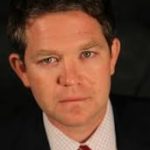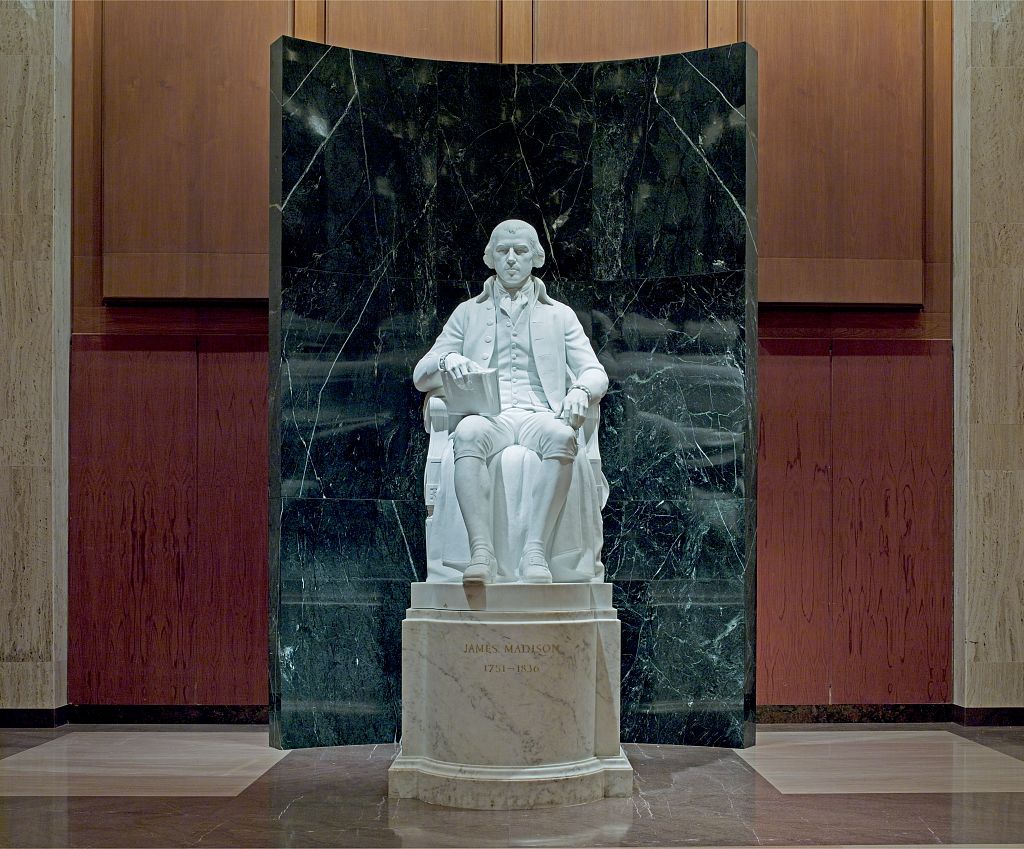Jay, your new book A Nation Forged by Crisis is excellent. It has already been widely reviewed, including in the Wall Street Journal, and it was recently named the best history book of the year by World magazine. More reviews and accolades are sure to follow.
I jotted down some notes as I was reading, but the questions I had were really tangential to the main thrust of your argument that U.S. history from the beginning has been deeply influenced by global events and disruptions in the international system. Your thesis is utterly convincing, and it puts U.S. history in a completely new light.
If you’ll indulge me, I have some questions on some nice small topics ranging from the ideas in the Declaration of Independence to historical inevitability, American exceptionalism, and whether the young United States was pro- or anti-slavery.
JUSTIN DYER

Let’s roll! Sounds good.
JAY SEXTON

Your book opens with the lines from the Declaration that “all Men are created equal and endowed by their Creator with unalienable rights . . . .” But then you go on to say that the first and final paragraphs of the Declaration contained the most critical lines. “Their object was constitutional and diplomatic, not ideological,” you conclude.
Aren’t the first and final paragraphs ideological, too, with references to nature and nature’s God, divine providence, and notions of what the colonies “of right ought to be”? By ideological, do you just mean something like what my father-in-law means when he says “academic,” i.e., lacking in immediate practical value?
How are ideological aims distinguished from constitutional and diplomatic ones? Your framing – and my father-in-law’s pejorative use of the word academic—reminded me of Lincoln’s closing line in an 1859 letter to Henry Pierce: “All honor to Jefferson–to the man who, in the concrete pressure of a struggle for national independence by a single people, had the coolness, forecast, and capacity to introduce into a merely revolutionary document, an abstract truth, applicable to all men and all times, and so to embalm it there, that to-day, and in all coming days, it shall be a rebuke and a stumbling-block to the very harbingers of re-appearing tyranny and oppression.” Was Lincoln right?
JUSTIN DYER

I agree that political scientists have something unique to bring to the table, and also have their own distortions and blind spots. So let me take a stab at the normative dimensions of scholarship, and then bring up the separate issue of curriculum and pedagogy. The word “morality” sometimes conjures up stained-glass, Sunday School imagery associated with the religious right, or the social justice righteousness associated with the progressive left. If we put those associations aside, though, and just think about the root questions of politics, I think we’d see that all political questions are at bottom questions of justice, human well-being, and the best or most prudent way to organize our common life in light of some conception (even if unarticulated) of human nature and purpose. I do agree that scholars of American political thought should diligently work to uncover the historical context and strategic environment in which political actors operated in the past, and try to understand individuals on their own terms. This kind of scholarship would not be political theory dressed up in patriotic garb, but it would be attentive to the questions posed by political theory and the ways actors in the American political tradition have answered those questions. I am also skeptical that scholarship can ever really be value-neutral. Maybe that was just part of my graduate training at Texas. Jeff Tulis argues in his 1991 article in Law & Social Inquiry (“On the State of Constitutional Theory”) that “descriptive-explanatory statements themselves rest on a series of normative presuppositions.” That seems right to me, and I’ve always thought we might as well be up front about what those normative presuppositions are.
A separate issue is whether our teaching of American political thought has a normative dimension as well. To give a fuzzy answer, I’d say “yes” and “no.” On the one hand, the best teachers are ones who are able to reconstruct the arguments and debates of the past accurately, and who create an environment in which students are free to question, challenge, and critically engage those ideas. On the other hand, we do have to make judgments about which ideas and topics are important enough to make it on the syllabus, and which readings are worthy of being assigned. The entire enterprise of higher education also is embedded in a particular political environment. In the case of public higher education, many of us teach at schools that are created and subsidized by the citizens of our state, and civic education was one of the explicit purposes of the institution in the first place.
JUSTIN DYER

I suppose one question is whether that approach served its purpose in 1991 and could now be replaced with another. But more immediately I would say that even though all inquiry rests on certain presuppositions, because examinations of political problems will involve claims of justice and therefore morality, it still seems true to me that the kind of inquiry will vary according to the subject of study. For example, I just don’t think Madison and Jefferson spent all that much time thinking about care of the soul, but it is clear that Emerson and Thoreau did. So to treat Emerson and Jefferson with the same kind of analysis — the same set of questions — would just be silly. Further, in my opinion, most of APT is closer to Madison and Jefferson than to Emerson and Thoreau in this regard, so I tend to start my analysis on that baseline.
I should state clearly that undergraduate teaching is an entirely different matter, and much depends on the context in the local curriculum.
JEREMY BAILEY

Thanks, Jeremy. I think there is quite a bit that we agree on. First, there is a lot of work in American political thought that has yet to be done, and much of that work involves putting American political thought in a deeper and richer historical context. Second, the set of questions will vary depending on the political actors we are studying (no disagreement there). Finally, how we understand scholarship on American political thought might be conceptually different than how we understand undergraduate teaching. Like many of our friends in the academy, my entry point into the discipline of political science was through a very good undergraduate course on American political thought. At the undergraduate level these kinds of courses serve a vital public purpose that is part of the core mission of most public universities.
To circle back to the questions we started with, then, I’d say that American political thought as a subfield of political science has gained momentum in recent years. The recent creation of an organized section of APSA devoted to American political thought, the launch of the peer-reviewed journal American Political Thought, and the creation of constitutional studies programs and centers on campuses across the country are all very positive developments. More fully integrating scholarship on American political history and American political thought seems to be one way that we can push the scholarly agenda in a positive direction. In terms of undergraduate education, classes on American political thought continue to meet an important need in the university curriculum, connecting students to the broader political tradition in the United States and serving the critical function of civic education.
JUSTIN DYER

I agree that there is momentum, and it’s been really great to have such a nice group of younger and older scholars take part in that. While I have dark thoughts sometimes about the future, especially in terms of graduate training, I am encouraged that there seems to be so much left to uncover.
JEREMY BAILEY

In my view, American political thought has yet to establish itself as a respectable scholarly enterprise because the vast majority of the scholarship over the last several generations has been primarily moralistic. This is true of the Left and the Right, both of which have been more interested in creating lists of good guys and bad guys according to some external set of assumptions. What we need to do is build the scholarship from the bottom up by starting with the political problems as understood from the theorists or political actors in question. This most of all requires lots of historical work, especially to understand the strategic imperatives on the ground (and Jack Rakove is the model I recommend on this point). But the good news is that the vast majority of this work has not been done — because the moralists have not been interested in it — and it is just waiting there within relatively easy reach. Actually, super easy reach.
JEREMY BAILEY

What are some paradigmatic examples of past scholarship that have been primarily moralistic in the sense you have in mind? Would you put something like Harry Jaffa’s Crisis of the House Divided in that category? Jaffa’s work is historically informed and grounded, but clearly Lincoln comes out as the good guy, and Douglas the bad guy. Would the alternative be some kind of a-moral or value-neutral inquiry into the ideas held by political actors in American history?
My own take is that normative, empirical, and historical analyses all have a place in scholarship on American political thought. Where the scholarship goes wrong is when it turns history into a morality play at the expense of the truth of what actually happened or what people were actually thinking. Our profession produces plenty of that, and I would agree that we need to do a better job situating political actors historically and understanding the strategic imperatives on the ground. So here is a question: what do political scientists bring to the table in this area of scholarship? What makes the subfield of American political thought distinct from intellectual or political history?
JUSTIN DYER

Jaffa is a good example. His Crisis of the House Divided is one of the best twenty books on America, but what makes it so good is the clarity that it brings to the political problem as understood by Lincoln and Douglas. And, unlike his later work and the tradition he inspired, I don’t read Crisis as succeeding or failing on the basis of its moral claims.
More generally, I just don’t think American political thought will be served by being normative political theory dressed up in patriotic clothing. We already have plenty of normative theorizing in the academy, and I am generally skeptical that there is more to be said on most moral things. In the case of American political thought, I am confident that there is still a good deal to be said because the field simply hasn’t been picked over yet.
As to the question of what makes what I am recommending different from intellectual or political history, the answer is that political scientists are trained to see political problems differently than are historians. This is because of our focus on design (and therefore on “elites”), and, in the case of political theory, because of our patience with texts and concepts in the philosophic tradition. That means that our work is likely going to be different — is likely going to see different angles — but it also means that our work has its own distortions. A well-known problem is our tendency to look for Aquinas or Spinoza lurking behind every corner. My view is that beginning with a moral agenda is also a potentially serious distortion, at least in terms of scholarship.
JEREMY BAILEY

I agree that political scientists have something unique to bring to the table, and also have their own distortions and blind spots. So let me take a stab at the normative dimensions of scholarship, and then bring up the separate issue of curriculum and pedagogy. The word “morality” sometimes conjures up stained-glass, Sunday School imagery associated with the religious right, or the social justice righteousness associated with the progressive left. If we put those associations aside, though, and just think about the root questions of politics, I think we’d see that all political questions are at bottom questions of justice, human well-being, and the best or most prudent way to organize our common life in light of some conception (even if unarticulated) of human nature and purpose. I do agree that scholars of American political thought should diligently work to uncover the historical context and strategic environment in which political actors operated in the past, and try to understand individuals on their own terms. This kind of scholarship would not be political theory dressed up in patriotic garb, but it would be attentive to the questions posed by political theory and the ways actors in the American political tradition have answered those questions. I am also skeptical that scholarship can ever really be value-neutral. Maybe that was just part of my graduate training at Texas. Jeff Tulis argues in his 1991 article in Law & Social Inquiry (“On the State of Constitutional Theory”) that “descriptive-explanatory statements themselves rest on a series of normative presuppositions.” That seems right to me, and I’ve always thought we might as well be up front about what those normative presuppositions are.
A separate issue is whether our teaching of American political thought has a normative dimension as well. To give a fuzzy answer, I’d say “yes” and “no.” On the one hand, the best teachers are ones who are able to reconstruct the arguments and debates of the past accurately, and who create an environment in which students are free to question, challenge, and critically engage those ideas. On the other hand, we do have to make judgments about which ideas and topics are important enough to make it on the syllabus, and which readings are worthy of being assigned. The entire enterprise of higher education also is embedded in a particular political environment. In the case of public higher education, many of us teach at schools that are created and subsidized by the citizens of our state, and civic education was one of the explicit purposes of the institution in the first place.
JUSTIN DYER

I agree that there is momentum, and it’s been really great to have such a nice group of younger and older scholars take part in that. While I have dark thoughts sometimes about the future, especially in terms of graduate training, I am encouraged that there seems to be so much left to uncover.
JEREMY BAILEY



